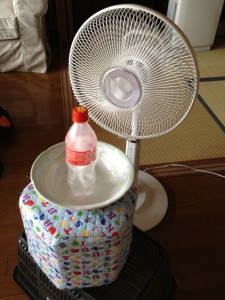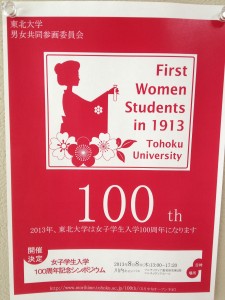life in Japan living in Japan materials personal technology
by sendaiben
2 comments
Summer tip: use a fan and ice instead of air conditioning
This post is dedicated to my friend Philip, ’cause he needs it right now 😉
This summer has been fairly mild in Sendai, but the last couple of weeks have been hotter. I don’t like air conditioning and prefer to use a combination of other strategies to stay cool outside of work. At home I wear as little as possible, sleep on bamboo sheets (one of the greatest inventions ever), and use an electric fan.
One way to make an electric fan more effective is to combine it with ice. This has two benefits: it takes some of the moisture out of the air through condensation and also lowers the temperature of the air slightly. You can see my setup in the picture above. A plastic bottle 2/3 full of water, frozen, a bowl to catch the condensation (this bottle accumulates a couple of centimeters of water in the bowl by the time it thaws out completely), and something to raise the bowl so that it is in front of the fan.
If you prepare three or four bottles you can rotate them fairly constantly and maintain a more pleasant environment without the expense, environmental damage, and air quality degradation of air conditioning.
Any other tips for the summer?
career expectations jobhunting life in Japan presentations public policy technology TED
by sendaiben
leave a comment
TED Talk: What will future jobs look like?
Here’s an optimistic TED talk on yesterday’s topic (thanks Tom!).
career expectations jobhunting life in Japan public policy technology
by sendaiben
13 comments
A future with no jobs -the most important social issue of our times?
I think the most important scientific issues of our times are climate change, energy sufficiency, and environmental pollution, but I believe that these will be solved by technology within my lifetime.
Recently, I have been reading a lot about a problem that will be caused by technological advances.
I read two books: Race Against the Machine ($3.99 on Kindle) and The Lights in the Tunnel ($3.95 on Kindle). They are both incredibly thought-provoking, and tell the same story: we are approaching a future without jobs.
Technological advances are resulting in more and more jobs being automated. Looking around me here in Japan I have seen petrol stations (self-service), restaurants (order from a touch panel) and supermarkets (self-checkout) directly replace workers with machines.
Amazon has replaced countless shops, and is in the process of automating their warehouses.
The latest thing in education is Massive Online Open Courses (MOOCs), allowing one teacher to deliver content to tens of thousands of students.
Foxconn, the company that assembles iPhones in China, is currently replacing it’s workers with robots.
Google’s driverless cars will eliminate taxi drivers, delivery drivers, and eventually driving schools, traffic police, and even street signs.
Increasingly sophisticated computer hardware and software will replace legal researchers, translators, middle managers, medical technicians, surgeons, and other knowledge workers.
So, as technology continues to improve at exponential rates, and human workers for jobs at both the blue- and white-collar levels continue to become surplus to requirements, what are people going to do? Are we going to have societies where 60%+ of the population are on welfare?
It’s terrifying.
I think I’m probably going to be okay, as I work in a public university in Japan (possibly one of the last sectors to face automation). Even so, I would be surprised if my job still existed in 15 years time.
One possible positive to come out of this is that Japan’s extreme demographics may turn out to be a blessing. When there is no need for a workforce, and unemployed people are a drag on society, a falling population could become an advantage.
Am I overreacting? This seems like the issue of our times, as it is going to result in huge changes to our social and economic systems, but it doesn’t seem to be part of public discourse.
I look forward to your comments 🙂
blogging expectations life in Japan personal university
by sendaiben
4 comments
Women in Japan
I just saw this poster in my building commemorating the fact that 100 years ago in 1913, Tohoku University was the first university in Japan to admit women as students. I didn’t know that, and I am quite pleased to be working at such a progressive place (here’s hoping they’ll be progressive enough to allow me to stay on past my initial contract LOL).
This is interesting to me in two ways:
1) has women’s place in Japanese society really improved all that much in 100 years?
2) is society going to facilitate women working in the future?
It always struck me as strange that there are such structural and societal limitations on women in a democracy where they make up more than half of the electorate… but I have come to realize that a lot of the obstacles working women in Japan face come from societal expectations, often voiced by other women. Japan seems to be one of the last holdouts of the housewife mother, to an extent that I haven’t seen in Europe of the US. Specifically, I am thinking about how volunteer and community groups (like PTAs, chounaikai, sports team parent groups, etc.) make no efforts to cut working mothers any slack. If anything, they seem to pick on them, at least in my limited experience.
At the same time you get politicians making asinine comments like this and you wonder if things are going to change in the future?
Looking at Japan’s demographic future (the government projects an aging population of less than 100 million by 2050), and lack of plans for mass immigration (this is the government’s focus at the moment, but I can’t see many people applying), women seem to be the economy’s last shot…
And yet women seem to have expectations of men that are becoming increasingly unrealistic, at least according to the small sample in the link. This has been mooted as one of the main contributing factors to the low birth rate -after all, if you don’t have enough money to get married, you probably aren’t going to be having children either (or at least one would hope so).
What do you think? Is Japanese society supportive of women choosing what to do in life? Can you see it changing in the future?
apple google iPhone life in Japan living in Japan personal technology
by sendaiben
leave a comment
Google Maps App for iPhone
Another tangent, I’m afraid. If you don’t have an iPhone you can probably stop reading now. If you have an iPhone that is running iOS 5 or less, this may be of interest. But if you have an iPhone running iOS 6 and you haven’t downloaded the Google Maps App yet, keep reading.
I’ve been playing with the new Google Maps App on my iPhone 4S for a couple of weeks now. The short version is that it is amazing.
(it’s not just me that thinks so, either: here’s the Wall Street Journal version)
The long version:
- all the accurate data from before
- better interface
- amazing driving instructions (it’s better than any dedicated satnav I have used)
- sharpened up graphics
I’ve used it a few times while driving, and the app is amazingly user-friendly. Clear voice directions, simple screen, very user-friendly (I particularly like the way you can scroll around the map then get back to your route with a simple ‘resume’ button).
The local transport functionality is there too: this is probably the thing I use my phone for the most. When in an unfamiliar city, the app gives accurate local train and bus times and connections -so much so that I use it instead of the official websites to find times.
No negatives I have found at this time. If you don’t have it get it now -it’s free.
*this review is only talking about the Google Maps App in Japan. I haven’t had the chance to test it abroad yet 🙂



